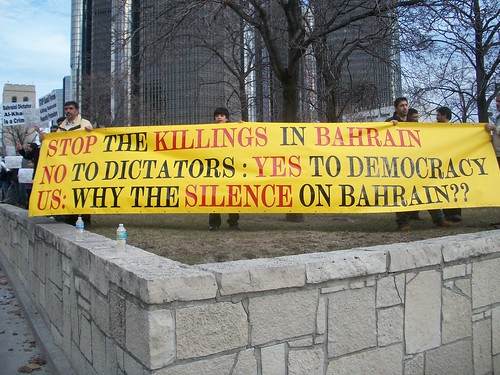
A demonstration in Detroit at the entrance of the tunnel to Windsor drew attention to the plight of critics of the U.S.-backed regime in the Gulf monarchy in Bahrain. The Saudi military has intervened to suppress demonstrations. (Photo: Abayomi Azikiwe) a photo by Pan-African News Wire File Photos on Flickr.
latimes.com/news/nationworld/world/la-fg-bahrain-20110319,0,7276848.story
latimes.com
Bahrain funeral turns into defiant protest
Defying a ban and violent crackdown, Shiite Muslim mourners at a funeral for a man killed by state security turn it into a protest against Bahrain's Sunni Muslim royal family.
By Neela Banerjee and David S. Cloud, Los Angeles Times
March 19, 2011
Reporting from Manama, Bahrain
Days after the Bahraini government banned demonstrations by opponents, about 2,000 residents of the mostly Shiite Muslim village of Sitra turned a funeral into the first protest under a new three-month state of emergency, a show of deepening resistance against the regime.
The government has arrested more dissidents and human rights workers, destroying their homes and also beating relatives, witnesses said. Many other activists have now gone into hiding in this tiny country, their family members said. The regime also demolished the towering national monument at Pearl Square traffic circle, where demonstrators had gathered for weeks before their rout Wednesday.
In Sitra, a long-time target of government raids, a funeral procession for a man killed by state security transformed into a protest against Bahrain's Sunni Muslim royal family. The peaceful demonstration reprised demands made before the crackdown, including the end of the monarchy and departure of foreign armies protecting the government. Young people and some Shiite organizations have hardened their positions, while official opposition groups said they would be open to negotiations once foreign troops leave and state violence ends. No one in the opposition is backing away from demands to fundamentally reform the autocratic government.
"All our demands are just," said a young man at the Sitra funeral who identified himself as Abu Hussein. He said he had witnessed the death of the man being buried, Ahmed Farhan Ali, who he said was shot point blank. "Before the last few days, I would have agreed to a constitutional monarchy. Now, I think the regime must fall."
Despite the bloodshed of the last three days — or perhaps because of it — Bahrain's opposition parties have responded cautiously. Wefaq, the main Shiite opposition party, and six other groups have demanded the departure of about 2,000 Saudi troops and United Arab Emirates police officers and an end to violence. But they have yet to join calls for the monarchy's elimination, which is sought by more radical groups and many Shiite youth, who have led the protests for the last month. Nor have they ruled out entering talks with the government once tensions abate.
Khalil Marzooq, a Wefaq member, acknowledged that the crackdown could radicalize more Bahrainis. "This is a very real possibility, but we are trying to win the public opinion with moderate positions," he said. "We are ready for dialogue but not with a gun to our heads."
Several banned parties, such as Haq and Wafah, that are popular among more combative Shiite youth, have called for the monarchy's end. But many of their leaders were detained Thursday and Friday, a message that those calling for radical change will be targeted.
Sitra had already seen heavy clashes amid raids by security forces Tuesday. The working class community was under a lockdown, its roads blocked by tanks and armored vehicles manned by ski-masked soldiers.
Resident Umm Zainab said she walked into her home Friday morning, hours after state security forces had swept through, looking for her husband, Ibrahim Taher, 41, a human rights worker. He had not been home when they came. She had not seen him in days, and she hoped that he had gone into hiding. Still, security forces had busted down doors, overturned couches and chairs, smashed pictures of him, and destroyed her bedroom.
About two miles away, in small room off a bare concrete courtyard, Khadija Salman Ali mourned the death of her son, Ahmed Farhan Ali, 30. He had been shot in the head Tuesday, and his body was returned after four days, despite pleas from his family. On Friday afternoon, crowds of men and women streamed into a square near a building where Ahmad's body was being prepared for burial and prayed in the street.
His coffin was brought out and carried over the mourners' heads, people touching its sides wrapped in the red and white Bahraini flag and papered with photos of him, some of him alive and others of him bloodied on a gurney. A helicopter circled high overhead. The mourners chanted that King Hamed ibn Isa Khalifa had betrayed them, and that he must step down and the troops from Saudi Arabia and police from the emirate of Dubai must leave.
"They face us with their guns," the mourners chanted. The coffin was set on a black SUV. "We face them with our bare hands."
Then they raised both arms in the air and shouted, "Peaceful, peaceful."
The car crept to the graveyard, small and barren, with crumbling headstones. The police had stayed away this time. After Ali's body was lowered, the crowd was told the funeral times for others who had been killed in another village.
"Do you know why he died?" a man called over a megaphone. "Protecting freedom, helping our injured brothers."
The crowd called back, "With our lives, our blood, we will sacrifice for our martyr."
neela.banerjee@latimes.com
david.cloud@latimes.com
Copyright © 2011, Los Angeles Times
No comments:
Post a Comment